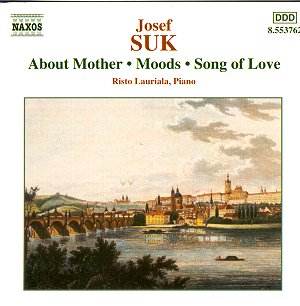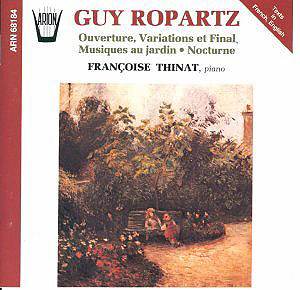 Composer: Josef Suk
Composer: Josef Suk
Works: Six Piano Pieces, Op. 7: Song of Love, Humoreske, Recollections, Idylls, Dumka, Capriccietto; About Mother, Op. 28: Quand maman était encore une petite fille, Jadis au printemps, Comme maman chantait, la nuit, à son enfant malade, Du coeur de maman, Souvenirs; Moods, Op. 10: Legend, Capriccio, Romanze, Bagatelle, Spring Idyll
Performers: Risto Lauriala (piano)
Recording: Small Auditorium, Tampere Hall, Tampere, Finland, 18-19 December 1996
Label: NAXOS
Josef Suk, a prominent figure in the late Romantic tradition and a protégé of Dvořák, occupies a unique niche in Czech classical music. His piano compositions, though less frequently performed than those of his contemporaries Fibich and Novak, reveal a lyricism coupled with emotional depth that resonates with both nostalgia and introspection. The present recording of his Six Piano Pieces, Op. 7, and subsequent works, provides an intimate glimpse into Suk’s evolving compositional voice, from youthful exuberance to poignant reminiscence.
Risto Lauriala’s interpretations bring a vibrant touch to this collection, particularly evident in the opening piece, “Song of Love,” where Suk’s lush harmonies and flowing melodies are rendered with a tender expressiveness that sets an inviting tone for the entire album. Lauriala’s ability to navigate the delicate balances of dynamics and phrasing showcases a keen sensitivity to Suk’s lyrical lines. In “Humoreske,” the pianist captures the lively spirit of the dance, infusing it with a buoyancy that contrasts beautifully with the more reflective “Recollections.” The latter piece is particularly notable for its subtle shading; Lauriala employs a nuanced approach that allows the wistful character of the music to unfold gradually, echoing the bittersweet themes prevalent in Suk’s oeuvre.
The recording quality deserves commendation, with the acoustics of the Small Auditorium enhancing the tonal richness of Lauriala’s performance. The clarity of the piano’s timbre is striking, allowing the listener to appreciate the intricate counterpoint and harmonic textures that Suk employs. This is especially apparent in “Dumka,” where the melancholy opening gives way to a spirited dance section. Lauriala balances these contrasting moods adeptly, illustrating the emotional breadth of Suk’s writing. However, while the recording captures the essence of Suk’s style effectively, it occasionally lacks the depth of color found in earlier interpretations by renowned Czech pianists like Jan Herman, whose recordings are imbued with a more profound architectural sense and tonal variety.
Suk’s “About Mother,” composed for his son, serves as a deeply personal homage that explores themes of motherhood and memory. Lauriala’s interpretation of this cycle is marked by an understated elegance, particularly in “Quand maman était encore une petite fille,” which evokes a sense of innocent nostalgia. The minimalist rhythmic underpinnings in “Comme maman chantait, la nuit, à son enfant malade” convey an emotional urgency, and Lauriala’s execution captures both the anxiety and tenderness inherent in the music. The journey through these pieces culminates in the final work, “Souvenirs,” where the emotional resonance of the cycle is palpable, conveying a profound sense of loss tempered by love.
Suk’s Moods, written at the age of 21, further illustrates his development as a composer. The opening “Legend” showcases a lyrical quality that oscillates between lightness and depth, while the “Capriccio” introduces a playful, dance-like character. Lauriala’s deft touch allows for the whimsical elements to shine, though it is in the introspective “Romanze” that his interpretative skills are most fully realized, revealing a poignant sensitivity that aligns with Suk’s evolving style.
The overall presentation of this recording provides a comprehensive introduction to Suk’s piano music, emphasizing both his lyrical gift and emotional depth. Lauriala’s performance, while lacking some of the dramatic contrasts of earlier recordings, offers a fresh perspective on these works, illuminating their inherent beauty and emotional complexity. This album not only serves as an excellent entry point for those unfamiliar with Suk’s piano compositions but also stands as a valuable addition to the catalog of recorded performances, encouraging listeners to explore the emotive landscapes that Suk so beautifully evokes.


